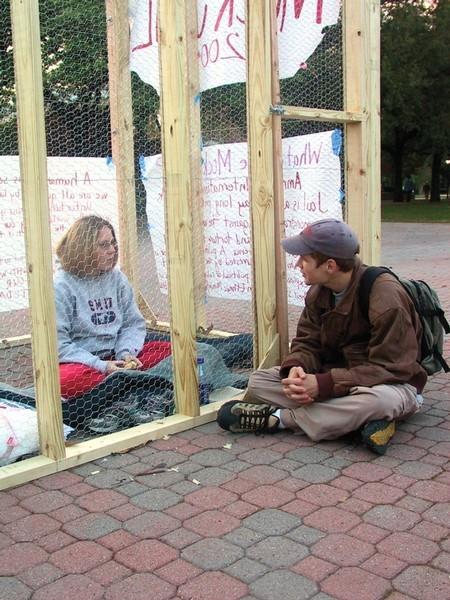
Student gets locked up for cause
For the next two days, students traveling past the flagpole willsee a “prisoner” held captive in an area composed ofwood and wire, smaller than the most miniscule dorm room.
The mock jail is part of Amnesty International’s quest forthe freedom of Abdukiram Abduveli, a political prisoner in Chinadescribed in a petition as “a 43 year old … who isserving over a 12-year sentence as a result of unfair trialproceedings.”
The petition is one that the members of Amnesty hope for 3,000students to sign within 72 hours, after which sophomore RachelBall, the prisoner in the mock jail, will be released. Ball, AIpresident and Indian studies major, sees her experience in jail asan opportunity to feel the pangs of imprisonment.
“This is just a small taste of what [real politicalprisoners] go through,” she said. “I feel like nomatter how cold or hungry I get, it is not even a drop in thebucket compared to what they are living.”
After a hiatus in 2003, the mock jail returns for its fourthyear on campus. According to vice president Laurie-Leigh Nix, 3,000signatures is an increase from past years.
“Amnesty used to only try for 2,000 petitions before thestudent was let out of the mock jail,” she said, “butsince we continued to reach that, 3,000 is a new goal to strivetoward.” Nix is also mindful that, while 3,000 signatures— which represents about half of the SMU student body —is enough to free a prisoner from the mock jail, it will take a lotmore for Abduveli to be granted his freedom.
“[Abduveli’s freedom] will be a lengthy and enduringprocess, and these multiple letters are just thebeginning.”
For 72 hours, Ball will survive solely on bread, water and thesupport of colleagues.
And while three days in a mock jail may prove arduous, Ballknows that her imprisonment will prove beneficial in the end.”It’s good to have a visual demonstration ofwhat’s going on abroad,” she said.








